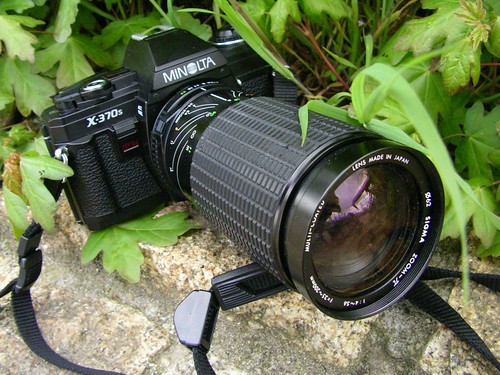Difference between revisions of "Minolta X-300"
m (Smoothed up flow of one line.) |
m (Corrected one clone name. Further research has confirmed this one.) |
||
| Line 22: | Line 22: | ||
| image_rights= with permission | | image_rights= with permission | ||
}} | }} | ||
| − | The '''X-300''', ('''X-370''') in its many forms, became the basis of Minolta's manual-focus SLR cameras after the introduction of the auto-focus Maxxum line. The various X-300's were less expensive than the new, [[autofocus|auto-focus]] cameras, but still had all the features that a new or experienced photographer needed. Production was moved from Japan to China around 1990, and the X-300 was and continues to be used as the basis for many others cameras from China, sold by [[Seagull]] (as the [[Seagull DF-300]], [[Vivitar V50]], [[Centon DF-300]], [[Seagull DF-300|Soligor SR-300 MD]], [[Seagull DF-300|Safari DF-300]], [[Seagull DF-300|Texer EX-3]], [[Seagull DF-300|Zenit DF-300]], [[Seagull DF-300|Carena DF-300]] and [[Seagull DF-300|SX-300]], [[Seagull DF-300|Revue DF-300]], [[Seagull DF-300|Kalimar | + | The '''X-300''', ('''X-370''') in its many forms, became the basis of Minolta's manual-focus SLR cameras after the introduction of the auto-focus Maxxum line. The various X-300's were less expensive than the new, [[autofocus|auto-focus]] cameras, but still had all the features that a new or experienced photographer needed. Production was moved from Japan to China around 1990, and the X-300 was and continues to be used as the basis for many others cameras from China, sold by [[Seagull]] (as the [[Seagull DF-300]], [[Vivitar V50]], [[Centon DF-300]], [[Seagull DF-300|Soligor SR-300 MD]], [[Seagull DF-300|Safari DF-300]], [[Seagull DF-300|Texer EX-3]], [[Seagull DF-300|Zenit DF-300]], [[Seagull DF-300|Carena DF-300]] and [[Seagull DF-300|SX-300]], [[Seagull DF-300|Revue DF-300]], [[Seagull DF-300|Kalimar KX-5000]]) and several other firms. One thing seems certain - the X-300 will live on, in one form or another, for many years to come. |
<br clear="all"/> | <br clear="all"/> | ||
Revision as of 05:12, 22 August 2016

|
| black X-300 image by Plischke Werner (Image rights) |
The Minolta X-300 is a 35mm manual focus SLR based on the MD mount produced between 1984 and 1990. The X-300 was also marketed as the X-370 in the U.S. and Canada.
A year after Minolta released the X-570, they introduced the X-300 to the photographic market. It was a less-expensive alternative to the X-570 thanks to fewer features. The body of the X-300 is nearly identical to that of the X-570. The only change, other than the nameplate, is that the shutter speed dial is now covered, only showing one speed at a time. In addition, the camera features are minimized. Perhaps the biggest feature change from the X-570 is that the X-300 lacks the OTF (off-the-film) flash mode -- which many find very useful. In addition, the X-300 lacks the DOF preview button, the PC connection, and the interchangeable screens of the X-570. Together, these changes reduced the price tag of the X-300 significantly.
Legacy

|
| Minolta X-300 image by phollectormo (Image rights) |
The X-300, (X-370) in its many forms, became the basis of Minolta's manual-focus SLR cameras after the introduction of the auto-focus Maxxum line. The various X-300's were less expensive than the new, auto-focus cameras, but still had all the features that a new or experienced photographer needed. Production was moved from Japan to China around 1990, and the X-300 was and continues to be used as the basis for many others cameras from China, sold by Seagull (as the Seagull DF-300, Vivitar V50, Centon DF-300, Soligor SR-300 MD, Safari DF-300, Texer EX-3, Zenit DF-300, Carena DF-300 and SX-300, Revue DF-300, Kalimar KX-5000) and several other firms. One thing seems certain - the X-300 will live on, in one form or another, for many years to come.
Camera Specifications

|
| image by Christopher Robin Roberts (Image rights) |
- Minolta
- Film format: 24x36mm frames on 35mm film
- Type: Single Lens Reflex
- Lens mount: MD Mount
- Split-image spot, microprism band and acute matte field focusing screen.
- In viewfinder shutter speed scale/LED display.
- Cable shutter release on body next to lens.
- Electrically controlled focal plane shutter 4 sec to 1/1000 sec (Auto), 1 sec to 1/1000th (Manual).
- 10 Second self-timer with LED indication.
- AE lock (15 seconds).
- ISO Range 12-3200
- 2 x AG13/LR44 batteries required.
